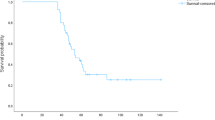Abstract
Purpose
This study aimed to develop a survival prediction model that might aid decision making when choosing between best supportive care (BSC) and brain radiotherapy (RT) for patients with brain metastases and limited survival expectation.
Methods
A retrospective analysis of 124 patients treated with BSC, whole brain radiotherapy (WBRT), or radiosurgery was conducted. All patients had adverse prognostic features defined as 0–1.5 points according to the diagnosis-specific graded prognostic assessment score (DS-GPA) or GPA if primary tumor type was not among those represented in DS-GPA. Kaplan–Meier survival curves were compared between patients treated with BSC or RT in different scenarios, reflecting more or less rigorous definitions of poor prognosis. If survival was indistinguishable and this result could be confirmed in multivariate analysis, BSC was considered appropriate.
Results
Irrespective of point sum examined, DS-GPA by itself was not a satisfactory selection parameter. However, we defined a subgroup of 63 patients (51 %) with short survival irrespective of management approach (only 5 % of irradiated patients survived beyond 6 months; they had newly diagnosed, treatment-naïve lung cancer), i.e., patients in whom foregoing RT was unlikely to compromise survival. These were patients with 0–1.5 points and aged ≥75 years, had Karnofsky performance status ≤50, or had uncontrolled primary tumor with extracranial metastases to at least two organs.
Conclusions
BSC is a reasonable choice in patients with limited life expectancy. After successful external validation of the selection criteria developed in this analysis, identification of patients who are unlikely to benefit from WBRT might be improved.



Similar content being viewed by others
References
Craighead PS, Chan A (2012) Defining treatment for brain metastases patients: nihilism versus optimism. Support Care Cancer 20:279–285
Danielson B, Fairchild A (2012) Beyond palliative radiotherapy: a pilot multidisciplinary brain metastases clinic. Support Care Cancer 20:773–781
Yamanaka R, Koga H, Yamamoto Y, Yamada S, Sano T, Fukushige T (2011) Characteristics of patients with brain metastases from lung cancer in a palliative care center. Support Care Cancer 19:467–473
Langley RE, Stephens RJ, Nankivell M, Pugh C, Moore B, Navani N, Wilson P, Faivre-Finn C, Barton R, Parmar M, Mulvenna PM, Investigators QUARTZ (2013) Interim data from the Medical Research Council QUARTZ trial: does whole brain radiotherapy affect the survival and quality of life of patients with brain metastases from non-small cell lung cancer? Clin Oncol (R Coll Radiol) 25:e23–e30
Nieder C, Norum J, Dalhaug A, Aandahl G, Pawinski A (2013) Radiotherapy versus best supportive care in patients with brain metastases and adverse prognostic factors. Clin Exp Metastasis doi:10.1007/s10585-013-9573-x
Gaspar L, Scott C, Rotman M, Asbell S, Phillips T, Wasserman T, McKenna WG, Byhart R (1997) Recursive partitioning analysis (RPA) of prognostic factors in three Radiation Therapy Oncology Group (RTOG) brain metastases trials. Int J Radiat Oncol Biol Phys 37:745–751
Sperduto PW, Berkey B, Gaspar LE, Mehta M, Curran W (2008) A new prognostic index and comparison to three other indices for patients with brain metastases: an analysis of 1,960 patients in the RTOG database. Int J Radiat Oncol Biol Phys 70:510–514
Sperduto PW, Chao ST, Sneed PK, Luo X, Suh J, Roberge D, Bhatt A, Jensen AW, Brown PD, Shih H, Kirkpatrick J, Schwer A, Gaspar LE, Fiveash JB, Chiang V, Knisely J, Sperduto CM, Mehta M (2010) Diagnosis-specific prognostic factors, indexes, and treatment outcomes for patients with newly diagnosed brain metastases: a multi-institutional analysis of 4,259 patients. Int J Radiat Oncol Biol Phys 77:655–661
Nieder C, Nestle U, Motaref B, Walter K, Niewald M, Schnabel K (2000) Prognostic factors in brain metastases: should patients be selected for aggressive treatment according to recursive partitioning analysis (RPA) classes? Int J Radiat Oncol Biol Phys 46:297–302
Nieder C, Marienhagen K, Geinitz H, Molls M (2009) Validation of the graded prognostic assessment index for patients with brain metastases. Acta Oncol 48:457–459
Nieder C, Andratschke NH, Geinitz H, Grosu AL (2012) Diagnosis-specific graded prognostic assessment score is valid in patients with brain metastases treated in routine clinical practice in two European countries. Med Sci Monit 18:CR450–CR455
Nieder C, Pawinski A, Molls M (2010) Prediction of short survival in patients with brain metastases based on three different scores: a role for ‘triple-negative’ status? Clin Oncol (R Coll Radiol) 22:65–69
Nieder C, Andratschke NH, Geinitz H, Grosu AL (2012) Use of the Graded Prognostic Assessment (GPA) score in patients with brain metastases from primary tumours not represented in the diagnosis-specific GPA studies. Strahlenther Onkol 188:692–695
Nieder C, Spanne O, Mehta MP, Grosu AL, Geinitz H (2010) Presentation, patterns of care, and survival in patients with brain metastases: what has changed in the last 20 years? Cancer 117:2505–2512
Nieder C, Norum J, Stemland JG, Dalhaug A (2010) Resource utilization in patients with brain metastases managed with best supportive care, radiotherapy and/or surgical resection: a Markov analysis. Oncology 78:348–355
Rades D, Evers JN, Veninga T, Stalpers LJ, Lohynska R, Schild SE (2011) Shorter-course whole-brain radiotherapy for brain metastases in elderly patients. Int J Radiat Oncol Biol Phys 81:e467–e473
Lagerwaard FJ, Levendag PC, Nowak PJ, Eijkenboom WM, Hanssens PE, Schmitz PI (1999) Identification of prognostic factors in patients with brain metastases: a review of 1292 patients. Int J Radiat Oncol Biol Phys 43:795–803
Rades D, Dziggel L, Haatanen T, Veninga T, Lohynska R, Dunst J, Schild SE (2011) Scoring systems to estimate intracerebral control and survival rates of patients irradiated for brain metastases. Int J Radiat Oncol Biol Phys 80:1122–1127
Sperduto PW, Kased N, Roberge D, Xu Z, Shanley R, Luo X, Sneed PK, Chao ST, Weil RJ, Suh J, Bhatt A, Jensen AW, Brown PD, Shih HA, Kirkpatrick J, Gaspar LE, Fiveash JB, Chiang V, Knisely JP, Sperduto CM, Lin N, Mehta M (2012) Summary report on the graded prognostic assessment: an accurate and facile diagnosis-specific tool to estimate survival for patients with brain metastases. J Clin Oncol 30:419–425
Khan L, Cramarossa G, Lemke M, Nguyen J, Zhang L, Chen E, Chow E (2013) Symptom clusters using the Spitzer quality of life index in patients with brain metastases—a reanalysis comparing different statistical methods. Support Care Cancer 21:467–473
Soffietti R, Kocher M, Abacioglu UM, Villa S, Fauchon F, Baumert BG, Fariselli L, Tzuk-Shina T, Kortmann RD, Carrie C, Ben Hassel M, Kouri M, Valeinis E, van den Berge D, Mueller RP, Tridello G, Collette L, Bottomley A (2013) A European Organisation for Research and Treatment of Cancer phase III trial of adjuvant whole-brain radiotherapy versus observation in patients with one to three brain metastases from solid tumors after surgical resection or radiosurgery: quality-of-life results. J Clin Oncol 31:65–72
Steinmann D, Vordermark D, Geinitz H, Aschoff R, Bayerl A, Gerstein J, Hipp M, van Oorschot B, Wypior HJ, Schäfer C (2013) Proxy assessment of patients before and after radiotherapy for brain metastases: results of a prospective study using the DEGRO brain module. Strahlenther Onkol 189:47–53
Tsao MN, Rades D, Wirth A, Lo SS, Danielson BL, Vichare A, Hahn C, Chang EL (2012) International practice survey on the management of brain metastases: Third International Consensus Workshop on Palliative Radiotherapy and Symptom Control. Clin Oncol (R Coll Radiol) 24:e81–e92
Fife KM, Colman MH, Stevens GN, Firth IC, Moon D, Shannon KF, Harman R, Petersen-Schaefer K, Zacest AC, Besser M, Milton GW, McCarthy WH, Thompson JF (2004) Determinants of outcome in melanoma patients with cerebral metastases. J Clin Oncol 22:1293–1300
Conflict of interest
The authors declare that they have no conflict of interest.
Author information
Authors and Affiliations
Corresponding author
Rights and permissions
About this article
Cite this article
Nieder, C., Norum, J., Dalhaug, A. et al. Best supportive care in patients with brain metastases and adverse prognostic factors: development of improved decision aids. Support Care Cancer 21, 2671–2678 (2013). https://doi.org/10.1007/s00520-013-1840-5
Received:
Accepted:
Published:
Issue Date:
DOI: https://doi.org/10.1007/s00520-013-1840-5




